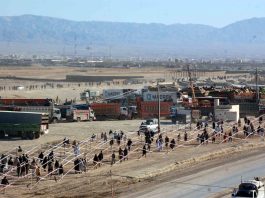ISLAMABAD: Bhagwan Das has overcome the obstacles faced by Pakistan’s Hindu minority to become a lawmaker in the national parliament. But there is one obstacle he still cannot overcome: as a member of a religious minority he cannot register his marriage.
Family laws in Muslim-majority Pakistan do not recognise minority faiths in the registration of marriages. Around 2.5 million Hindus live in Pakistan, according to the 1998 census. Hindus are the largest religious minority in Pakistan, representing just under two per cent of the population.
Without any documentary recognition of their marriage, Hindu women face problems in getting their names changed in their computerized national identity cards and passports. They also encounter problems when it comes to inheritance and divorce. The most alarming problem impact is that it leaves them vulnerable to abduction, forced conversion to Islam and forced marriage to Muslim men.
Das is part of the ruling Pakistan Muslim League-Nawaz of Prime Minister Nawaz Sharif and sits on one of the seats reserved for religious minorities. He has not been able to push his government to enact laws to allow Hindus to register their marriages.
The Hindu Marriage Registration Act was introduced to parliament in 2014 by Ramesh Kumar Vankwani, another legislator also from PML-N. The bill also outlaws forced conversions to Islam. The bill is still pending.
“We cannot raise our community’s issues,” Das told News Lens Pakistan.
He said lawmakers on reserved seats were not given the same voice as those sitting on directly-elected seats in the Parliament. “Only those who were directly elected can raise their voices.”
Lawyer Maroof Mittha has compiled a report titled ‘Religious Minorities and Marriage Laws in Pakistan’ for regional development organisation Community World Service.
Unregistered marriages cause problems for Hindu women in obtaining documents leading to difficulties in accessing government services, education and traveling aboard, he said.
“It is almost impossible for Hindus to prove marriages before courts. This absence of proper legislative framework facilitates forced conversion and consequent marriages,” Mittha told News Lens Pakistan.
“The basic problem is that the government has failed to develop consensus on the issue of divorce,” Mittha said.
Ramesh Kumar Vankwani, a legislator also from PML-N, introduced a bill to parliament to regulate Hindu marriages two years ago. The bill has been shelved.
“I am exhausted because no-one has paid heed in the last six months despite my efforts,” Vankwani told News Lens Pakistan.
“We drafted a bill which was to be approved by the federal cabinet but it never appeared on the agenda of the meetings,” he added.
Married women are picked up by local feudal lords in Sindh province and, unable to prove their married status, are forcefully converted to Islam to marry a Muslim man, he said.
Mittha believes that allowing Hindu marriages to be registered would prevent the forced conversion of Hindu girls.
“Once the law is enacted, it would stop forced conversion and then the marriage of minor girls.”
He said that the Supreme Court had directed National Database and Registration Authority to facilitate the Hindu community in registering their marriages and obtaining national identity cards.
But the marriage certificate created by the Authority is full of mistakes,” Vankwani said. An entry on the form asks for the name of the nikhahkhwan, the Muslim cleric who administers marriages, instead of the name of Hindu cleric who solemnizes Hindu marriage.
Members of the Hindu community had begun moving across the border and “they are not returning from India,” Das said.



